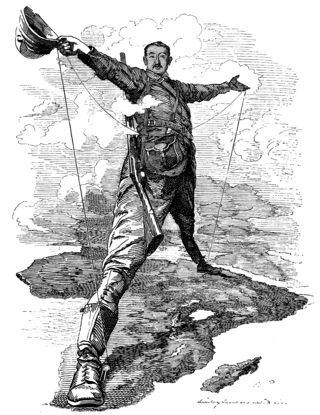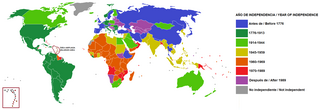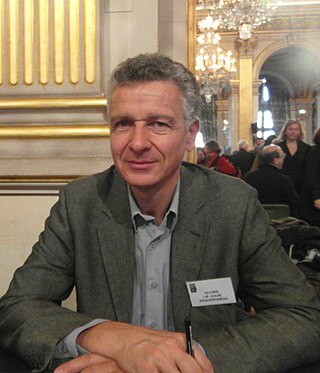See also
- Early modern period, the era from 1400–1800 CE
- Age of Discovery or Exploration, the period from c. 1418 – c. 1620 during which seafarers from European countries explored, colonized, and conquered regions across the globe
- Colonialism
Colonial period (a period in a country's history where it was subject to management by a colonial power) may refer to:

A colony is a territory subject to a form of foreign rule. Though dominated by the foreign colonizers, the rule remains separate to the original country of the colonizers, the metropolitan state, which together have often been organized as colonial empires, particularly with the development of modern imperialism and its colonialism. This coloniality and possibly colonial administrative separation, while often blurred, makes colonies neither annexed or integrated territories nor client states. Colonies contemporarily are identified and organized as not sufficiently self-governed dependent territories. Other past colonies have become either sufficiently incorporated and self-governed, or independent, with some to a varying degree dominated by remaining colonial settler societies or neocolonialism.

Colonialism is the exploitation of people and of resources by a foreign group. Colonizers monopolize political power and hold conquered societies and their people to be inferior to their conquerors in legal, administrative, social, cultural, or biological terms. While frequently advanced as an imperialist regime, colonialism can also take the form of settler colonialism, whereby colonial settlers invade and occupy territory to permanently replace an existing society with that of the colonizers, possibly towards a genocide of native populations.
Colonial or The Colonial may refer to:

Imperialism is maintaining or extending power over foreign nations, particularly through expansionism, employing both hard power and soft power. Imperialism focuses on establishing or maintaining hegemony and a more or less formal empire. While related to the concepts of colonialism, imperialism is a distinct concept that can apply to other forms of expansion and many forms of government.

Colonization is a process of establishing occupation of or control over foreign territories or peoples for the purpose of cultivation, trade, exploitation or settlement, setting up coloniality and often colonies, such as for agriculture, commonly pursued and maintained by, but distinct from, imperialism, mercantilism, or colonialism. Colonization is sometimes used synonymously with settling, as with colonisation in biology.

The French colonial empire comprised the overseas colonies, protectorates, and mandate territories that came under French rule from the 16th century onward. A distinction is generally made between the "First French colonial empire", that existed until 1814, by which time most of it had been lost or sold, and the "Second French colonial empire", which began with the conquest of Algiers in 1830. On the eve of World War I, France's colonial empire was the second-largest in the world after the British Empire.

Decolonization is the undoing of colonialism, the latter being the process whereby imperial nations establish and dominate foreign territories, often overseas. The meanings and applications of the term are disputed. Some scholars of decolonization focus especially on independence movements in the colonies and the collapse of global colonial empires.

Frederick John Dealtry Lugard, 1st Baron Lugard, known as Sir Frederick Lugard between 1901 and 1928, was a British soldier, mercenary, explorer of Africa and a colonial administrator. He was Governor of Hong Kong (1907–1912), the last Governor of Southern Nigeria Protectorate (1912–1914), the first High Commissioner (1900–1906) and last Governor (1912–1914) of Northern Nigeria Protectorate and the first Governor-General of Nigeria (1914–1919).
Internal colonialism is the uneven effects of economic development on a regional basis, otherwise known as "uneven development" as a result of the exploitation of minority groups within a wider society which leads to political and economic inequalities between regions within a state. This is held to be similar to the relationship between a metropole and a colony, in colonialism proper. The phenomenon leads to the distinct separation of the dominant core from the periphery in an empire.

The territorial evolution of the British Empire is considered to have begun with the foundation of the English colonial empire in the late 16th century. Since then, many territories around the world have been under the control of the United Kingdom or its predecessor states. When the Kingdom of Great Britain was formed in 1707 by the union of the Kingdoms of Scotland and England, the latter country's colonial possessions passed to the new state. Similarly, when Great Britain was united with the Kingdom of Ireland in 1801 to form the United Kingdom, control over its colonial possessions passed to the latter state. Collectively, these territories are referred to as the British Empire. When much of Ireland gained independence in 1922 as the Irish Free State, the other territories of the empire remained under the control of the United Kingdom.

The decolonisation of Africa was a series of political developments in Africa that spanned from the mid-1950s to 1975, during the Cold War. Colonial governments gave way to sovereign states in a process often marred by violence, political turmoil, widespread unrest, and organised revolts. Major events in the decolonisation of Africa included the Mau Mau rebellion, the Algerian War, the Congo Crisis, the Angolan War of Independence, the Zanzibar Revolution, and the events leading to the Nigerian Civil War.

Belgium controlled several territories and concessions during the colonial era, principally the Belgian Congo from 1908 to 1960, Ruanda-Urundi from 1922 to 1962, and Lado Enclave from 1884 to 1910. It also had small concessions in Guatemala (1843–1854) and Belgian concession of Tianjin in China (1902–1931) and was a co-administrator of the Tangier International Zone in Morocco.

A colonial empire is a collective of territories, either contiguous with the imperial center or located overseas, settled by the population of a certain state and governed by that state.

Olivier Le Cour Grandmaison, is a French political scientist and author whose work chiefly centres on colonialism. He is best known for his book Coloniser, Exterminer - Sur la guerre et l'Etat colonial.

Western European colonialism and colonization was the Western European policy or practice of acquiring full or partial political control over other societies and territories, founding a colony, occupying it with settlers, and exploiting it economically. For example, colonial policies, such as the type of rule implemented, the nature of investments, and identity of the colonizers, are cited as impacting postcolonial states. Examination of the state-building process, economic development, and cultural norms and mores shows the direct and indirect consequences of colonialism on the postcolonial states. It has been estimated that Britain and France traced almost 50% of the entire length of today's international boundaries as a result of British and French imperialism.

The historical phenomenon of colonization is one that stretches around the globe and across time. Ancient and medieval colonialism was practiced by the Phoenicians, Greeks, Romans, Turks, Han Chinese, and Arabs.

Relations between France and Algeria span more than five centuries. Through this period, there have been many changes within each of the nations, with consequent effects on their relations. Algeria was once part of the Ottoman Empire, and in the 19th century was conquered and colonized by France. It played an important role in both world wars.
Postcolonialism is the critical academic study of the cultural, political and economic consequences of colonialism and imperialism, focusing on the impact of human control and exploitation of colonized people and their lands. The field started to emerge in the 1960s, as scholars from previously colonized countries began publishing on the lingering effects of colonialism, developing a critical theory analysis of the history, culture, literature, and discourse of imperial power.

Settler colonialism is a logic and structure of displacement by settlers, using colonial rule, over an environment for replacing it and its indigenous peoples with settlements and the society of the settlers.

The connection between colonialism and genocide has been explored in academic research. According to historian Patrick Wolfe, "[t]he question of genocide is never far from discussions of settler colonialism." Historians have commented that although colonialism does not necessarily directly involve genocide, research suggests that the two share a connection.